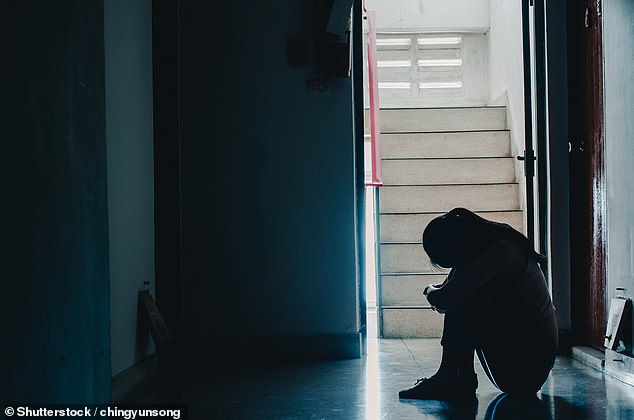The proportion of children with mental health issues is 50 per cent higher than before the pandemic, an NHS study revealed yesterday.
It found that one in six youngsters now had a condition such as anxiety, depression or loneliness.
Experts said the figures were ‘deeply distressing’ and blamed the closure of schools and worries over Covid-19.
Young women are the worst affected, with a quarter of those aged 17 to 22 identified as having a ‘probable mental disorder’.
An NHS study revealed that one in six youngsters now had a condition such as anxiety, depression or loneliness (stock image used)
The Mental Health of Children and Young People in England survey, published by NHS Digital, was carried out in July. It is based on interviews with 3,570 children and their parents.
The report showed a big increase in levels of mental health problems compared with 2017, the last time the survey was conducted.
Three years ago, one in nine children was classified as probably having a mental disorder. But that figure is now one in six.
Lead author Tamsin Ford, who is a professor of child and adolescent psychiatry at Cambridge, said the ‘significant deterioration in children’s mental health’ was likely to be linked to lockdown.
She added: ‘We do know that loneliness is very toxic, and social isolation is very toxic for mental health.
‘The amount of change that children and parents reported in the survey and our own experiences of the pandemic would suggest very strongly that changes must relate to that.
‘If you think of a teacher with 30 children in their class, they’ve gone from three children in their class with difficulties to five children in their class.
‘The majority of children have told us that they feel lockdown has made their lives worse. This has obviously coincided with the period where schools have been closed.’
Four in ten children said lockdown had made their lives worse, with around 15 per cent saying it was ‘much worse’.
Another 37 per cent of children aged five to 16 worried about whether friends and family would catch Covid-19, while almost a third had problems sleeping.
Dr Bernadka Dubicka, chairman of the child and adolescent faculty at the Royal College of Psychiatrists, said: ‘It’s deeply distressing to see such a sharp increase in the number of young people living with a mental illness, more so as lockdown and poverty has made many of their lives significantly worse.
‘Services were already struggling to cope with demand before Covid-19, but access has been even worse since lockdown started.
‘We are now seeing more patients needing emergency or urgent treatment because they’ve become so ill while waiting to be seen.’
Professor Prathiba Chitsabesan, NHS England’s associate national clinical director for children and young people’s mental health, said many youngsters were experiencing anxiety, sadness and loneliness because of the pandemic.
She added: ‘Simple steps like getting enough sleep, talking to friends or family and ensuring your child has a simple routine can make a huge positive difference.
‘And the NHS, children’s services, schools, colleges and the voluntary sector are working together to provide a range of support including 24/7 crisis support lines, face to face, telephone or digital appointments and support in schools so issues can be identified and help offered sooner.’
Anne Longfield, Children’s Commissioner for England, said the figures were alarming.
‘It should shock the Government into immediate action to tackle a growing epidemic,’ she said. ‘While there have been some welcome improvements in children’s mental health services over recent years, clearly the scale of the problem is getting worse, and what has been promised is just not enough.
‘The NHS will have to upscale radically its plans for children’s mental health just to meet its existing commitments.
‘Every school needs an NHS funded counsellor as a minimum, and we need a children’s mental health service that is properly funded, with no postcode lottery.’
Richard Crellin, of the Children’s Society, said: ‘This must be a wake-up call for the Government about the severity of the situation and the need for further, urgent action to support children.’

